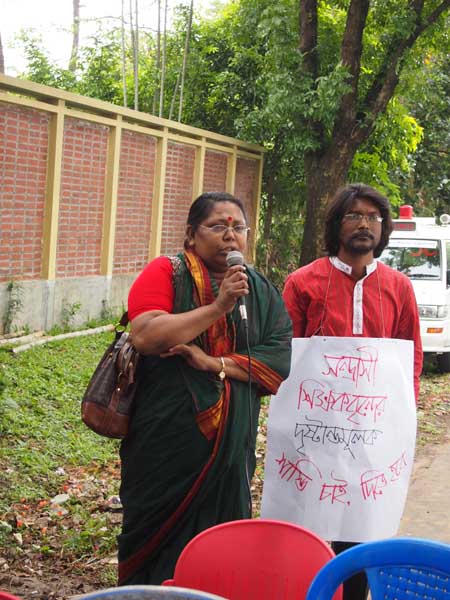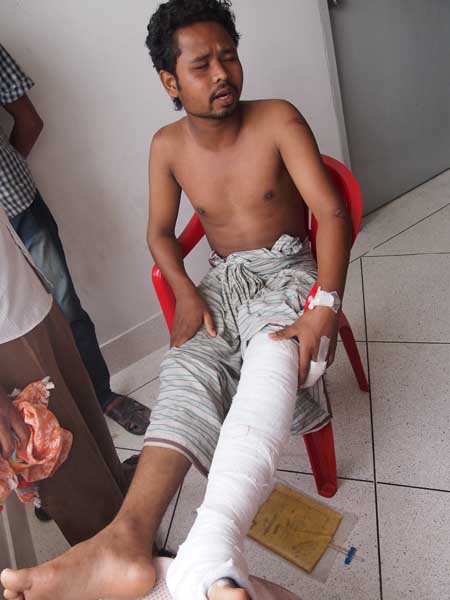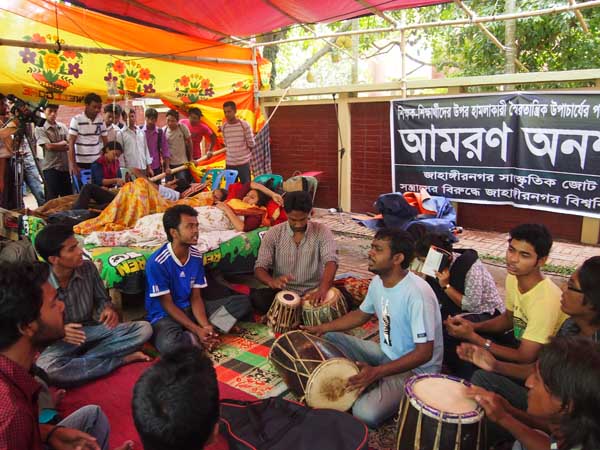by rahnuma ahmed



The strike has been called off.
At first, the large body of teachers of different political persuasions — left-inclined, Awami League, Bangladesh Nationalist Party, and also, ones with no political allegiances whatsoever — who had united as Shikkhok Shomaj (Teachers Society) at Jahangirnagar, called off their four-month long strike.
Naseem Akhter Hussain, its convenor and leader of the 12 member strong delegation which met the prime minister at the latter’s invitation on May 3 morning, informed the press in the evening, at the end of a 5-hour long Shikkhok Shomaj meeting, “The prime minister has assured us and we have full confidence in her. So we are calling off our programme. We are hoping she will resolve it soon.”
Immediately after the announcement, Shikkhok Shomaj (SS), as a collectivity disbanded the 8-day long seige of the vice-chancellor professor Sharif Enamul Kabir’s residence, which had begun after two members of the SS had been picked up by the police and detained overnight, which, agitating teachers insist, was based on spurious allegations (see photo 1).
However, individual teachers, grouped in cells on a roster basis, remained outside the vice-chancellor’s residence, to oversee the medical needs of fast-unto-death students, to provide protection in case if ‘VC League’ goons attacked again. The two teachers, Shoma Momtaz and Dr Shamima Sultana, who had joined the students, discontinued their fast-unto-death hunger strike the next morning.
The students — who had joined in the seige after the VC League’s thugs had attacked and beaten up Jahangirnagar Shangskritik Jote’s (JSJ) members on April 28 (see pic 2) –however, refused. Immediately after the SS called off its movement, Shakila Sharmin, general secretary of the JSJ told waiting members of the press, “We welcome the prime minister’s assurance. But we will continue with our hunger strike as long as the vice-chancellor does not step down.”
They did, two days later. On May 5 afternoon, eight students were persuaded by Awami League lawmaker and former cinema actress, Sarah Begum Kobori to end their hunger strike. Kobori assured the students in the presence of Naseem Akhter Hussain, that the prime minister would discuss the matter with the chancellor, that she would not “disappoint” them. However, Shakila Sharmin was quick to assert, while we have confidence in the prime minister, if our demand is not met shortly, we will resume our agitation against the vice-chancellor. Television news reports showed shots of students marching in an interim victory procession.
Was the Shikkhok Shomaj’s decision to call off the agitation hasty? Abrupt? Insensitive toward the striking students, for, after all, a joint platform had been formed, Shikkhok-Shikkharthi Shonghoti Moncho, after Jote’s student-activists had been attacked by the ‘VC League.’ Would it have been better if the SS had withdrawn some of its programmes as a gesture of respect and goodwill towards the prime minister’s overture, but had not called off the entire movement until her assurances had yielded concrete results? Controversy rages, as information and speculation filters through. The prime minister had insisted, it had to be all or nothing. Further, she had implied, if the teachers didn’t agree, it would be their fault.
The exercise of concentrated and unbridled power, I’m inclined to think, had possibly manoeuvred the teachers into a tight corner, particularly those, who, although firm in their convictions, have previously not experienced ruling power at close quarters. At how swirling waves of stately pomp and privilege can sweep to the margins the monstrous stories of corruption and terror that the teachers had unburdened to the prime minister.
Government spokespersons had at first constructed the agitation as “a BNP-Jamaat affair,” out to destabilise the campus, to embarass the government. But that increasingly became difficult to sustain, and was finally exposed as sheer Awami League propaganda when a staggering number of widely known and respected persons, both secular and non-partisan, not only lent their support to the protest movement but took the trouble to go to the campus. To join the sit-in.
Desperate attempts had been launched by members of the ruling circle, but these failed. Such as the one by Tarana Halim, actress, AL lawmaker and JU senate member who went to campus on May 1; she insisted, at her “own” initiative. She spoke to “both” sides for hours at length and told the press, arguments made by neither could be dismissed. To top it all, Tarana wrote about it in bdnews24.com’s Bangla Blog. The title itself — “Bisshobiddaloye eto ronger ki dorkar?” — drew heavy criticism, one commentator reminded her that not only was the color grouping of politically partisan teachers needed (white, blue, pink), Bongobondhu Porishod was needed, Bongomata Porishod was needed, Zia Porishod was needed, or else, he said, “how will you/your ruling party decide who to appoint as the vice-chancellor?”
In contrast, Kobori’s intervention appeared genuine and sincere. She spoke of Zubair’s mother’s grief, of her own fight against terror in her constituency, of how, if the vice-chancellor had “truly” been a teacher, he would have resigned long ago to help resolve the crisis.
Over the last few days, events at Jahangirnagar have moved so fast that the government’s manufacturing of teacher-student protests as being “a BNP-Jamaat affair,” have had few takers-on, despite being revised and re-created by groups and forces closely aligned with the Awami League. For instance, the Sammilita Sangskritik Jote, the largest alliance of cultural organisations, in a press conference in Dhaka on May 3, while protesting against the attack on JU’s cultural activists, expressed fears about whether Shibir had secretly infiltrated JSJ. They would conduct an enquiry, they said, since conspiracies to foil the 1971 war crimes trials were afoot. Their stand spoke of a dead refusal to address the issue of violence on campus. To address the issue of the source of that violence.
Jahangirnagar’s red earth seemed redder to me when I joined the Unmukto Shonghoti Moncho (Open Solidarity Platform), alongwith many, many others from Dhaka — public intellectuals, academics, human rights and development activists, cultural activists, journalists, former students — to express my solidarity with the movement for a terror-and-corruption-free campus on May 1, 2, and 4.
Had final year Honor’s student Zubair Ahmed’s blood, killed allegedly by members of the ‘VC League’, made it redder?
As storm winds lashed out, as sheets of rain poured down, I wondered if it was a message from Zubair up there somewhere. I wondered whether he was testing our collective resolve to seek punishment for his killers — those who had pushed the metal rods into his body, those who had provided protection to his killers from near and afar, as well as those JU academics who had feigned ignorance.




Leave a Reply
You must be logged in to post a comment.